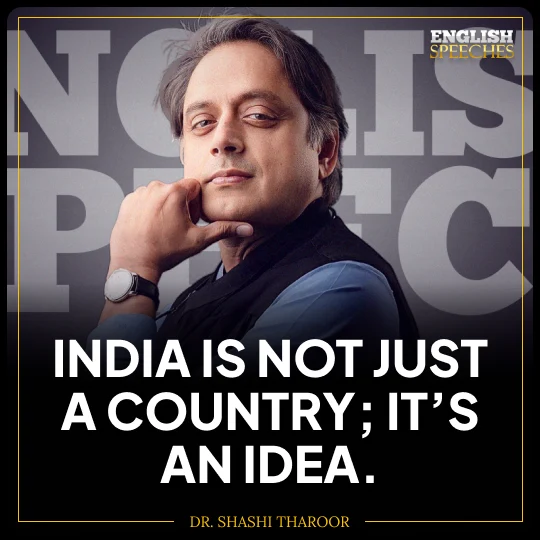Dr. Shashi Tharoor’s conversation at the Hili Forum 2024 explored the complex interplay between chaos and opportunity in the current global landscape. In his speech, titled “Opportunity or Chaos? The New World Disorder,” Tharoor dissected the significant geopolitical shifts and challenges facing nations today. From the rise of China to the backlash against globalization, he emphasized the importance of resilience and adaptability in navigating this new world order.
A Global Stage in Transition
During his speech, Dr. Shashi Tharoor painted a detailed picture of how the world is evolving amidst rising tensions and uncertainty. He outlined four key trends shaping the global landscape today:
- Backlash Against Globalization: Tharoor highlighted the growing dissatisfaction in developed countries, where economic and cultural consequences of globalization have sparked unrest. This backlash, he explained, is leading to a shift in national policies and attitudes toward international cooperation.
- The Rise of China: Tharoor pointed to China’s growing assertiveness in political, economic, and military domains, challenging the previously dominant position of the United States on the global stage.
- European Ambivalence: Europe’s place in this evolving world order is uncertain, particularly as it grapples with its involvement in crises like the conflict in Ukraine. Tharoor noted the continent’s internal struggle over its role in global affairs.
- New Forms of Cooperation: Despite the growing tensions, Tharoor identified the emergence of new platforms for international cooperation, particularly among nations of the global South, which are seeking greater representation without aligning with traditional Western powers.
Tharoor stressed that while these developments may seem disruptive, they also open the door to transformative opportunities for global leadership and collaboration.
Key Lessons and Themes
Dr. Shashi Tharoor’s address at the Hili Forum offered critical insights and themes relevant to both world leaders and citizens:
- Resilience in Uncertainty: Tharoor emphasized that resilience is key in an unpredictable world. Nations must be prepared to adapt to shifting power dynamics and use the challenges they face as opportunities for growth.
- Multilateralism Over Bipolarity: As the global order moves away from traditional East vs. West power struggles, Tharoor advocated for a more inclusive, multilateral approach to international relations, urging countries to form new alliances and partnerships.
- The Role of the Global South: Tharoor underscored the increasing importance of countries in the global South, which are rising in influence and seeking a greater voice in international diplomacy without being anti-West.
- Containment vs. Constraining: Rather than resorting to containment policies, Tharoor argued for strategies that limit the negative impacts any single nation can have on global stability, promoting cooperation over isolation.
- China’s Assertiveness: Tharoor acknowledged China’s growing influence but cautioned against viewing its rise solely as a threat, suggesting instead that it be managed through strategic collaboration and diplomacy.
In his reflection on the current global turmoil, Dr. Tharoor provided a compelling call for nations to reimagine their approach to international relations and use this moment of disruption as a springboard for positive change. His insights offer valuable lessons for navigating an increasingly complex and interconnected world.
Donwload available for Premium Subscribers
PDF Full Transcript
Explore every word with our concise PDF transcripts.
Audio Version
Immerse in speeches with clear, downloadable audios.
English Lesson
Enhance English skills with interactive speech lessons.
⚬ Free 30-day trial

”India is not just a country; it’s an idea.
Transcript
Host: During the recent years, especially the last months, we’ve really witnessed an unprecedented convergence of crisis, political tensions, wars, economic instability, and the health pandemic a few years ago, along with the growing, of course, impact of climate change, which is very important for the world and this planet. Countries, nations, institutions, and individuals are facing a challenge that tests their resilience… our resilience, actually, and vision for the future. However… I like this however… history often shows that chaos can also be a breeding ground for innovation, transformation, and new opportunities. Today, in this session, we will explore how the current global turmoil might not only be a source of concern for all of us but also a catalyst for positive change. Thank you for being with us. I will start with you, Your Excellency, Doctor Shashi. How do you define the current state of global turmoil?
Dr. Shashi Tharoor: You know, we had a period when the Cold War bipolarity gave way to two overlapping and by and large positive developments. Globalization spread around the world, knitting us together economically, technologically, and so on. And, of course, from 1990, with the end of the Cold War, came the unipolar moment when the US seemed to be in a position of dominance… technologically, economically, militarily, politically. Now, this has suddenly been challenged by four developments I’d like to briefly identify.
The first is the backlash against globalization, which gathered pace and had two components, economic and cultural. The economic backlash involved people in developed countries saying, “Why are we voting for governments that are sending our jobs off to China and India?” And I think there was a cultural backlash as well, against the cosmopolitanism that came with globalization… Davos man flitting around the globe, the migrants who were entering different countries. That cultural backlash has been described very effectively as a clash between the “somewheres” and the “anywheres”… the anywheres being people like us here who can speak anywhere in the world, and the somewheres being those anchored in one country, one religion, one language, one place. So that’s the first major trend.
The second, I would say, was the end of the peaceful rise of China, which took place during that period of globalization. China became more assertive, more effective, and challenging US dominance in all these areas… political, economic, technological, military.
Third, and this is where Carl, I’m sure, will have a lot more to say, is Europe. I remember Carl telling me a few years ago, “Oh, there’s an arc of crisis from the Nile to the Indus.” Well, it’s gone well beyond the Nile… now Ukraine has dragged Europe into this arc of crisis. And I think there is a certain European ambivalence as well about where they fit into all of this… ambivalence over Ukraine, ambivalence over China, and of course, Russia right on their doorstep.
The fourth and final trend I see is the emergence of new theaters of international cooperation in response to all this. You’ve got the talk about the Indo-Pacific for the first time. We’ve got references to the rise of the rest, which is now being talked about as the global South, which is seeking to be non-West without being anti-West and expressing its ambitions in different ways. I mean, it’s a cliché that in world affairs, you’re either at the table or on the menu. You don’t want to be on the menu, so you have to find ways of expressing your opportunities at the high table. They’re also trying to do this, and this is manifesting itself in multiple ways we can talk about… plural, lateral arrangements, new groupings, and so on…
Host: Amazing overview of the situation that could have led to this turbulence. So, backlash globalization, cultural and economic… China, Europe, and the new emerging countries. Doctor Shashi, here you mentioned China. As we witness shifting power dynamics during the last decade, so the last 20 years, between East and West, what impact do you believe this rivalry… having on global stability and cooperation? And you mentioned it… it’s mainly China and America.
Dr. Shashi Tharoor: Well, I mean, China is definitely now emerging as a new hegemon, a new significant… whether you want to call it a superpower or whatever… a challenge to the US. At the same time, the Chinese and the Americans have levels of cooperation and interdependence that never existed during the Cold War between the US and the Soviet Union. You’ve got more Chinese investments in US treasury bonds, more American investments in the Chinese economy. You got Chinese students in America, American tourists in China… all of these things didn’t happen during the Cold War, so it’s not quite the same thing. But there are a number of concerns.
China’s become much more assertive on its borders… maritime as well as land. Land with us in India, where we’ve had a very unpleasant incident that ended 44 years of peaceful coexistence on our otherwise disputed frontier. We’ve had incidents in the South China Sea with the Japanese, the Philippines, and Vietnam. So, it’s a different China from what we had gotten used to in the early days.
Host: And the high-tech power… the advance of China.
Dr. Shashi Tharoor: Remarkably in high tech solar, they’re world leaders… 5G, they’re perhaps ahead of America… we’re not entirely sure, but there’s an awful lot of progress happening. So, technologically, they’re doing well. Militarily, they’ve almost caught up… the Chinese Navy is almost as well equipped as the American Navy now. They’ve got more planes, more soldiers, obviously. And as far as the economy is concerned, they have already supplanted the US as a manufacturing power, as an industrial power, and they will overtake the US economy.
Host: And they are eating this… between the first powerful country that is the US, they are coming second economically, and they are climbing the scales to more and more be closer to America, which the US doesn’t like. What are the alliances? We talk about alliances, EU. We have BRICS that was joined by UAE, for example, Egypt, and Saudi Arabia. We have NATO as an alliance. We have ASEAN as an alliance. I’m talking about economic blocks and, of course, military blocks as well. What are they, from all those classes?
Dr. Shashi Tharoor: Well, there’s a proliferation of such groupings. The Americans, of course, still rely heavily on NATO, and what’s interesting is that the Russian invasion of Ukraine has resulted in Sweden and Finland joining NATO, which was never on the cards until the Russians invaded Ukraine.
Host: But it’s okay to say for now? Because if Trump is coming, NATO will not be in a really good position.
Dr. Shashi Tharoor: Well, we’ll have to see. But it’s not just NATO. What Americans are doing is creating smaller groupings, mini-life groupings everywhere. So, where countries are not willing to be allies in the formal sense, like India, they’ve created partnerships. There is a group called the Quad… which is US, Japan, Australia, and India. There’s another group called the Squad, where it’s the Philippines instead of India. There’s the Australia-US-UK or AUKUS, which is now a military alliance because all three are formally allied. And you’ve got all of these different things happening to try and shore up the effort of the Americans to match economic decoupling from China on the one hand with geopolitical and military containment of China. So, that’s interesting. China, on the other hand, has no allies. Show me a Chinese ally. There isn’t one. They have dependencies… they have countries that are dependent on them…
Host: They have soft power in Africa, Doctor Shashi. How is that? They have a lot of African countries. They are allies because they build and invest.
Dr. Shashi Tharoor: They’re not alliances; they’re dependencies. They are given an awful amount of aid, and those countries are suitably grateful. But the fact is… these are not countries they can use in a geopolitical conflict or standoff. Linked to that is the big question mark over the Chinese-Russian partnership. You remember, just before the Ukraine war started, Mister Putin visited Beijing, and there was this announcement of a no-limits partnership. Well, some of the limits are already becoming apparent in terms of how far the Chinese can go to support the Russians. On top of that, you’ve got the question of… the fact that Russia… on the one hand is more and more dependent on China… economically, in trade, in terms of sanctions, militarily, and so on. But at the same time, they have relations with countries that are not so happy with China, including India and Vietnam.
Host: My question now is, do you see an opportunity for cooperation between these alliances to be part of conflict resolutions in many parts of the world?
Dr. Shashi Tharoor: Well, for the sake of the world, I hope so, because we’re not sitting here saying we’re all doomed to inevitable conflict. But those opportunities will require some very, very serious and imaginative rethinking… both of global structures, which, frankly, the United Nations was created after two world wars, the Holocaust, Hiroshima. You’re not going to get that kind… God willing… we’re not going to get that kind of crises. So we need, even in times of relative peace and calm, to find the global imagination to redesign global systems, accommodate different voices, give the global South more of a voice, give the Chinese a place that is respectable without allowing them to dominate, and give countries like India, Africa their own place of honor. All of that needs to be done. Secondly, we need to move away from the risk of greater bipolarity. We need to, for example, move away from this language of “containment,” which is very rife in Washington even today, into something more like “constraining” rather than containing. Limiting how much damage any one country can do to its neighbors and others. And maybe instead of decoupling, we should be talking about multiplying our relationships… economically as well as politically… rather than actually ending any relationships. And this will require multiple efforts by various countries across the world.
Host: Thank you very much for attending. Thank you so much.






